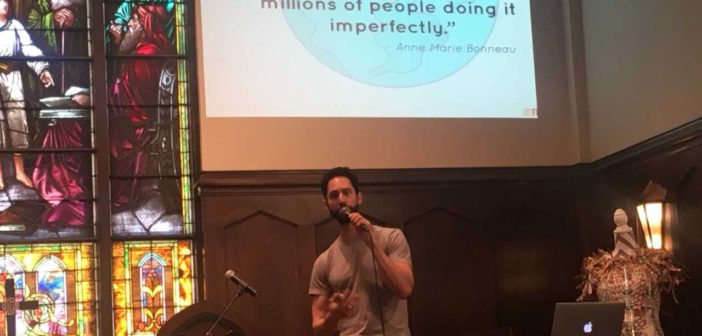As part of year two of NCC’s Sustaining the Globe series, the Center for Global Education invited rap activist Joey Feinstein to campus on April 25.
Feinstein, known as Joey FineRhyme, is the founder and director of Climate Cycle, an organization encouraging students to “green our world.” He uses rhythm and rhyme to disseminate his message of balance and cohesiveness with the natural world.
“When it comes to sustainability, we need greater mental agility,” said FineRhyme. “Every object in our life can be used toward sustainability or toward creating greater strife.”
In his efforts to provide new ways of sustainability, FineRhyme explained that he uses glass water bottles that can be reused and recycled. He also brings a specific bike with him to his lectures. The bike uses what FineRhyme calls “human-powered energy.”
“There are copper coils inside the wheel and as they spin they generate electricity.” A cord connects the bike to FineRhyme’s computer, microphone and speakers.
FineRhyme explains that the difference between the electricity produced by the bike and the electricity produced in our homes is the type of current.
“What comes out of our wall is AC — alternating current. This is direct current, which makes it much more efficient.” The amount of energy produced will power the computer, microphone and the speakers for his lecture.
Once the bike is powering all his tools, FineRhyme delves into the ways humans are contributing to the decreasing amount of wildlife, the shrinking of the oceans and global climate change as a whole. One of the biggest impacts humans are having on the changing temperatures is through trash.
“We tell ourselves we’re throwing something away as though at that point it simply disappears,” said FineRhyme. “But that is not the case. That is an out-of-sight, out-of-mind mentality. We are ignoring the basic fundamentals of cause and effect.”
FineRhyme said individuals need to consider what happens to the trash when it is out of their line of sight.
“Best case scenario,” said FineRhyme. “Our trash ends up in a landfill.” Yet the number of landfills that have been created over the years has increased dramatically.
FineRhyme calls this rapid accumulation of trash around the globe a “trash rash.” He explains that even when trash is supposed to end up in landfills, it often ends up in waterways like the Pacific Ocean instead.
The effect of this “trash rash” is that animals are dying off, unable to determine trash from natural nesting sources or even food. FineRhyme says everyone must “think of the ramifications” to people as well as to the animals and the natural world.
Yet, FineRhyme says there is still time to reverse some of the damage being done to the Earth. FineRhyme explained the concept of the Five R’s: refuse, reduce, reuse, repurpose, recycle.
Refuse to purchase or use harmful products that can end up in a landfill or waterway; reduce trash output by using less product; reuse instead of buying new; repurpose an item rather than discard; recycle when possible.
In participating in the Five R’s, FineRhyme believes everyone can fight the “trash rash.”

